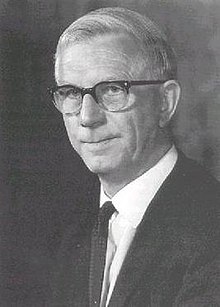Charles Oatley
| Sir Charles Oatley | |
|---|---|

Charles William Oatley (1904-1996)
|
|
| Born |
14 February 1904 Frome, Somerset, England |
| Died | 11 March 1996 (aged 92) |
| Residence | UK |
| Nationality | British |
| Fields | Physicist and Electronic engineer |
| Institutions |
Radio Accessories English Electric Valve Company King's College London ADRDE University of Cambridge |
| Alma mater | St. John's College, Cambridge |
| Academic advisors | Edward Victor Appleton |
| Doctoral students |
Haroon Ahmed Alec Broers Thomas Everhart Colin J. R. Sheppard |
| Known for | Scanning electron microscope |
| Influences | John D. Cockcroft |
| Influenced | Constance Tipper |
| Notable awards |
Duddell Medal (1969) Royal Medal (1969) Faraday Medal (1970) Mullard Award (1973) Potts Medal (1989) |
Sir Charles William Oatley OBE, FRSFREng (14 February 1904 – 11 March 1996) was Professor of Electrical Engineering, University of Cambridge, 1960–1971, and developer of one of the first commercial scanning electron microscopes. He was also a founder member of the Royal Academy of Engineering.
He was born on Valentine's Day, February 14, 1904.
He was educated at Bedford Modern School and St. John's College, Cambridge. He was a director of the English Electric Valve Company from 1966 to 1985.
In 1969 he was elected to the Royal Society.
Oatley also received an Honorary Doctorate from Heriot-Watt University in 1974. In that same year, he was knighted.
He received an Honorary Degree (Doctor of Science) from the University of Bath in 1977. He retired from the English Electric Valve Company in 1985.
He was awarded the Howard N. Potts Medal in 1989. He died on 11 March 1996.
Oatley and the graduate students he supervised made substantial contributions, particularly to the development of the scanning electron microscope (SEM).
"A project for a Ph.D. student must provide him with good training and, if he is doing experimental work, there is much to be said for choosing a problem which involves the construction or modification of some fairly complicated apparatus. I have always felt that university research in engineering should be adventurous and should not mind tackling speculative projects."
...
Wikipedia
